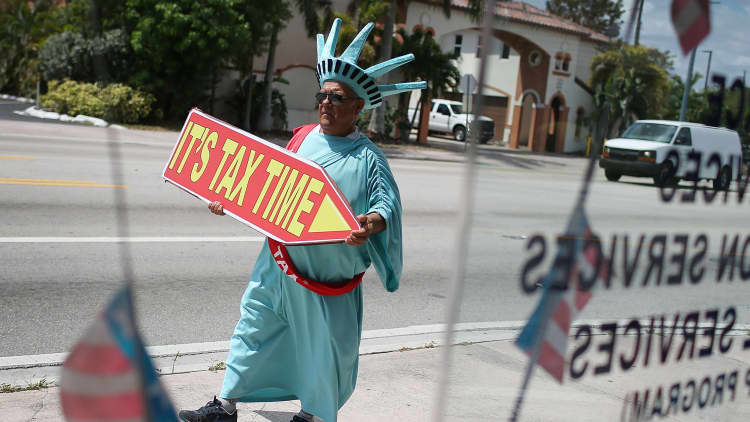Before Anthony Bourdain's career took off with his best-selling memoir, "Kitchen Confidential," the chef had zero savings and hadn't filed taxes in a decade.
"In my daily life, the goal was to muffle the anxiety that I'd feel as I tried to drift off to sleep knowing that, at any point, what little money I had in my bank account could be garnished by the IRS," he told online investing service Wealthsimple in 2017.
A risky career shift, from cooking to becoming a professional writer, changed Bourdain's approach to money and after that he became "very careful about the decisions I make every day." He called up the IRS and his credit card company, paid what he owed and, since then, he has been "fanatical" about never owing anyone money.
What actually happens if you don't pay your taxes? CNBC spoke to Lisa Greene-Lewis, certified public accountant and TurboTax blog editor, about the consequences you could face. Although everyone's tax situation is different, here are some of the things that might happen if you don't submit your 2017 tax returns by the filing deadline, which this year is Tuesday, April 17.

There are different penalties for not filing your taxes and not paying your taxes, Greene-Lewis tells CNBC.
If you don't file, you'll be slapped with a failure-to-file penalty, which is 5 percent of your unpaid taxes for each month your tax return is late, up to 25 percent of your unpaid taxes. That means, if you owe $1,000 and do not file, your penalty alone could reach $250 after five months of not filing your return.
If you file your taxes but don't pay them, the penalty is far less: Generally, the IRS will charge you a failure-to-pay penalty of 0.5 percent of your unpaid taxes for each month you don't pay, up to 25 percent. Interest also accrues on your unpaid taxes. The interest rate is equal to the federal short-term rate, plus 3 percent.
In short, even if you're only a couple of months behind on your taxes, the consequences can pile up, thanks to fees and interest. And you may miss out on a refund by not filing. After all, "the IRS reports every year that they have close to $1 billion in unclaimed refunds," says Greene-Lewis. "And those refunds are averaging about $700. That's a lot of money."
Even if you can't pay your taxes, file. "In most cases, the failure-to-file penalty is 10 times more than the failure-to-pay penalty," the IRS reports. You can always apply for a payment plan with the IRS to resolve your tax debt.
, you may have more than fees to deal with. The IRS could take action such as filing a notice of a federal tax lien (a claim to your property), actually seizing your property, making you forfeit your refund or revoking your passport.
Now that you're inspired to get started on your 2017 tax returns, if you haven't done so already, read up on the common errors that can slow down the filing process.
This is an update of a previously published story.
Like this story? Like CNBC Make It on Facebook!
Don't miss: How an H&R Block tax preparer spends his 11-hour days during tax season



